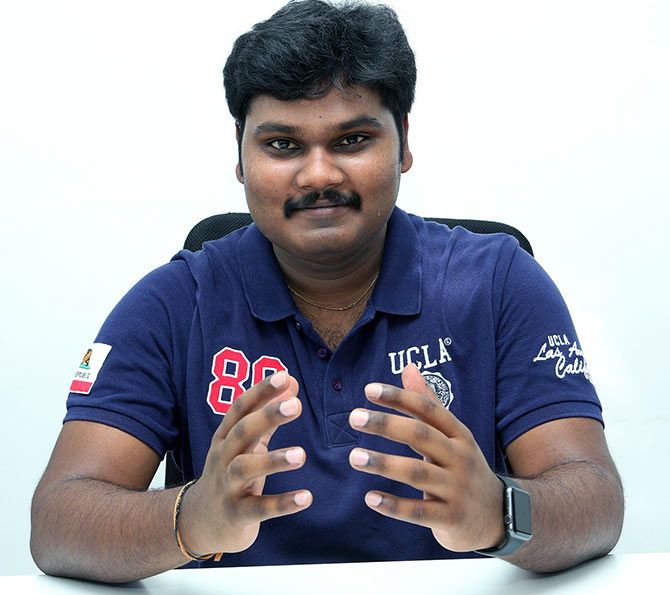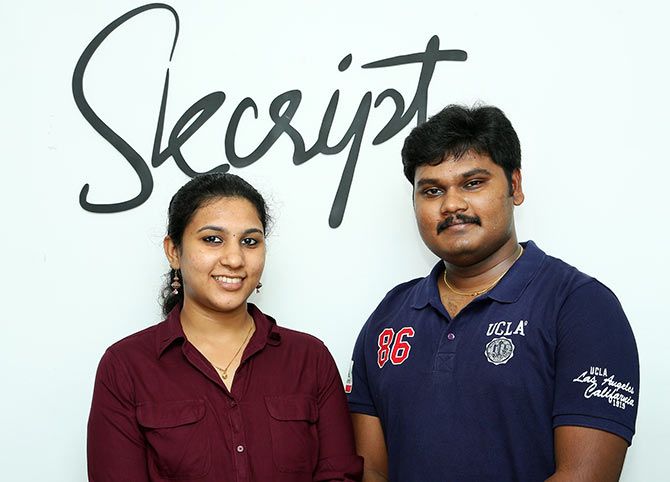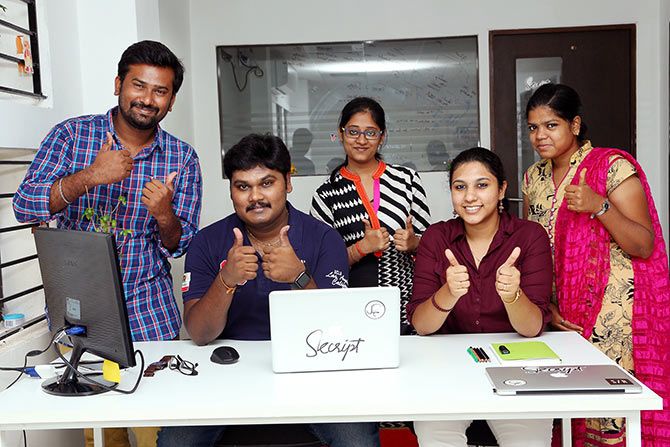 | « Back to article | Print this article |
Karthik Kamalakannan was eight years old when he was first introduced to computers -- it was a hard earned gift his father received from his employer.
In 2013, when he started his company, he did not have money to spend on office space, so his car became his workplace.
This is his amazing story!

The HBO comedy show, Silicon Valley, is about a fictional start-up called Pied Piper and the lives of its developers who write algorithms to compress files.
When Silicon Valley was being aired, two young programmers heading a Chennai-based start-up called Skcript were also writing codes to compress files. They were so short of cash that they couldn't afford an office space; they wrote the codes inside their car.
When 27-year-old Karthik Kamalakannan founded Skcript with his friend Swathi Kakarla in December 2013, little did he realise that it would become the Pied Piper of India one day.
Karthik and Swaathi had to fight their way through several hardships to realise their dream. Their saviour was an investor from Bangladesh, whom they found through Karthik's cousin. He provided them with the funds they needed to develop Shrink, the product that compresses files.
Within a short span, Skcript was hired by high paying clients from the Middle East, US and India. Soon, they had a swanky office.
Karthik tells Shobha Warrier/Rediff.com that his journey as an entrepreneur is a tale of perseverance, patience, dreams and a dash of luck.
Steve Jobs, my hero
Even as a child, I wanted to do what others were not doing. In school and college, everybody wanted to work with big companies; my dream was to start a company of my own.
My biggest inspiration, when I was in the fourth standard, was Steve Jobs. Instead of posters of cricketers and film stars, my room was filled with his pictures.
Getting a computer at the age of eight
I grew up in Tiruvallur, Tamil Nadu, where my father Kamalakannan worked for Oriental Insurance. Though he was not able to study beyond Class 12, he worked really hard.
When he earned business worth more than Rs 2 crore (Rs 20 million) in one year for his company, he was gifted a computer, printer and an internet connection.
In fact, the offer was either cash or the computer. My father opted for the latter as he thought it would help me.
I was eight years old then. I still remember the day. We went to pick up the HCL computer at night.
We decided to keep it in the drawing room, but I had to wait till the next morning for the computer engineers to come and load it.
The first boot was magical. That dial-up connection welcomed me into a new world.
No games, only learning
It was through this window that I learned all about computers and a virtual world full of knowledge.
I had no interest in games like my friends. Till I finished Class 10, I didn't play a single game on my computer.
Initially, I used it to learn English and to type.
Growing up in such a small place, the chances of learning fluent English are quite grim. Then, I moved to learning about computers and computer languages like C and C+.
On weekends, I used to go to Kanchipuram to learn computer languages from my cousin who was studying them at a computer centre with the hope of getting a job. Computer languages fascinated me. By age 10, I started programming in C.

The Microsoft Student Partner programme
I joined an engineering college near Chennai to pursue computer science and spent all my time after college learning more and more about computers.
The first step was joining the Microsoft Student Partner programme after successfully completing seven rounds of interviews.
This opened another window through which I could see the IT world.
I made the maximum use of the Microsoft Student Partner programme.
Instead of attending college, I used to go to the Microsoft office in Chennai and work on projects.
Since I was a young kid in the office, the others -- who had experience of 10 to 15 years -- helped me. I learnt to write good professional code that would help customers.
From the day I touched the computers at the age of eight till today, not a day has passed without learning something new.
Starting a company in college
In my second year at college, I started a company called 20 QBE Solutions along with my friends, Prithviraj and Arulraj.
We were dissatisfied with the kind of websites that were built in those days and thought we could do better.
We had a few clients and made Rs 2 lakhs to Rs 3 lakhs (Rs 200,000 to Rs 300,000) per assignment.
We were so naive that we hired two people and shared rented office space in the heart of Chennai. Though we made Rs 10 lakhs (Rs 1 million) in one-and-a-half years, we had no money left with us when the market crashed. It was obvious we didn't know how to build a company.
So, when we graduated in 2010, there was a lot of pressure from our families to take up a job and not restart the company.
But running a company as a college student was a huge learning experience.
I understood that you shouldn't get into services since there are already a million service-based companies from India who can do much better than you as they have been in the business for years.
If you want to make a difference, you should be a product-based company. And if you want to be a product-based company, you need working capital.
At 21, I learnt these lessons.
iOS engineer at Apple
Though I joined Wipro due to pressure from my family, after two years I knew I had to quit. The good thing was I got a chance to work for a project with Apple and then with Apple as an iOS engineer.
As a boy who idolised Steve Jobs, it was a dream come true. Working for Apple was one of the highs of my career. All that I did not learn in the first 24 years of my life, I learnt in the two years I was with Apple.
During my visits to the US while working for Apple, I met people who said India was for IT coolies and China for hardware. It hurt me. I felt it was high time we came up with products and sold them in the world market.
Starting a Google Developers Group in Chennai
Even when I was in college, I wanted to move in a community that talked technology but most of my classmates only talked about film stars and films.
That was the reason why I, along with a friend, Jayanthan, who used to organise technology events at college, gathered a few like-minded geeks in 2010 and informally started the Google Technology User group. It turned out that there were quite a few geeks in Chennai and we met regularly.
As the numbers grew -- we were soon over 100 members -- Google started supporting us and rebranded it the Google Developers Group; there are around 500 such groups across the world.
At one such event I met my co-founder Swathi Kakarla. She was the only female developer in our group of 100 people who met almost every month.
We had strikingly similar ideas about developing products and running a company. She can write very good code, that's how we became friends.
Both of us love programming, we love the idea of creating something by writing code. We want every single code we write to be like Ilayaraja's symphony.
In December 2013, we decided to start our own company. We named it Skcript because we believe that communication, whether through sign language or written language or spoken language or code language, is key.
The spelling Skcript has the first letters from our names and also the first letters of my parents's names, Shyamala and Kamalakannan. I wanted to tell my mother that the SK stands for their names so that she would be happy.
Starting with a shared workplace
I had only managed to save Rs 1 lakh. Swathi was still a student.
We didn't have enough money for an office. That didn't deter us from starting our own company and creating a dream product.
We initially worked in a shared workspace, which meant we could rent chairs in a common room.
We only needed to pay for the chairs. We sat there with our laptops and wrote our codes. Swathi worked after college hours while I worked all day.
Days and months passed and there came a time when I didn't have money to pay for the shared work space because we hadn't started earning yet.
Car becomes the office
I had my car, a Ford Figo, that I had bought after I started working. It became our work space. I would park the car wherever there was free parking and we would write our code.
There were instances when the police would look at us with suspicion. Luckily, they didn't harass us because we kept the car doors open and didn't work after sunset.
For three months, the car was our office. Mind you, we didn't have a client. We were just developing something we thought would help us eventually.
We believed that some day a break would come our way! I think God was testing our perseverance.
Only Rs 120 in the bank
There came a time when we just had Rs 120 in the bank. We had no money to pay for diesel. I decided to go back to Apple.
Swathi would join some company and we would make enough money before chasing our dream again.
When I returned home, a cousin came to meet me. His friend in the Middle East wanted a solution to solve the data explosion problem he was facing.
We had three products in mind. One dealt with data compression, but we hadn't taken it up because we knew it would need a huge financial investment.
I spoke to this guy from Dubai and fixed up an appointment to meet him the next day. I knew that was the last chance I was going to have and I made the best pitch I had done in my entire life.
He was in Chennai and I fixed up an appointment to meet him the next day. It was our last chance and I made the best pitch I could.
He was impressed and said he would pay 50 per cent as advance and the rest after we built the product.
What he gave as advance was very big money for us.

Shrink is born
Now, we were charged up.
We checked with them at every point while developing the product and wrote the code as per their requirement.
In less than 60 days our product, Shrink, was ready. We had beaten our deadline by a month.
Our client was so happy with our product that they became our sales agent in Dubai. Shrink was officially launched in Dubai at the tech event, GITEX.
Shrink uses compression algorithms to minimise files to the smallest possible size.
Imagine how much data is stored in a 1GB memory card! But, after you shrink your data, you can store 1.5GB to 2GB data in the same memory card.
What we do is in the magnitude of 100 gigabytes and 96 per cent smaller in size.
In three months, we broke even and moved to a good office. We have seven people working for us. As our product is priced at few thousands to hundreds of thousands dollars per year, within a year, we had a revenue of around $200,000.
Right now, we have 10 customers, mostly from the Middle East, the US and India. Our partners include GSS, Microsft, Goodgle, iGrid and Amazon Web services.
Pied Piper and Skcript
It was during our struggling days, when we were working from my car, that we heard about the HBO show, Silicon Valley, and the Pied Piper developers. It was interesting to know that they too were working on compressing files.
Looking back, it seems like an adventure but it was also a tough time for us. It is a terrible psychological and emotional experience when all your friends are earning big salaries and you don't even have money for rent.
Now that we have crossed those days of struggle, my ambition is to build a world-class company.
The biggest lesson I have learnt is to never stop believing in yourself. Miracles do happen if you are patient.